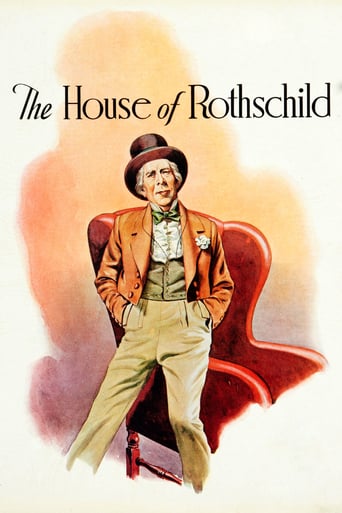bbmtwist
A deserved Best Picture Oscar nom for this drama, making a plea for racial and ethnic tolerance, in its depiction of the Rothschild family and its successful run as a bank and money lender, here depicting its initial rise during the Napoleonic years.Arliss plays two roles, initially the patriarch, Meyer, and for the bulk of the film, his son, Nathan. Helen Westley plays the matriarch and Florence Arliss, Nathan's wife. Two "Youngs," Loretta and Robert, play the romantic leads.The screenplay is excellent as is the acting and direction all around. I am surprised Arliss did not receive a nomination. The final scenes in three strip Technicolor last a mere 3:15 minutes.Interesting to note that Arliss portrayed three historical characters that all interwove their destinies: Disraeli would secure a loan for the Suez Canal through the Rothschild family, the Duke of Wellington was an advocate and supporter of Nathan and his family.
bkoganbing
Before Paul Muni was doing biographical films at Warner Brothers, George Arliss was doing them before. Arliss a veteran of the British theater was one of the first to recognize the importance of film in preserving the actor's art. He did even more silent films than sound which took advantage of his magnificent speaking voice and perfect English diction. His acting today is considered hammy by many, but for me I like the idea of being able to understand every enunciated word.In The House Of Rothschild Arliss plays the dual role of patriarch Meyer Rothschild and later Nathan, one of the five sons whom he dispatched to various European capitals to establish the family banking business. This was in the 1780s-90s. By 1814 the House is well established throughout Europe and even when countries are at war, The House Of Rothschild acts as a unit. Though the Paris branch has to be a bit discreet with Napoleon Bonaparte making war on all the rest of the places the brothers have set up shop.The money lender is never a popular figure. It's the reason why when Jews were forbidden to own land and frozen out of certain businesses and trades, they were allowed to be bankers. That way it was a double whammy in unpopularity for them.The House Of Rothschild even with Napoleon making entreaties to the Jewish people backs the Allied cause to the hilt. It wins the gratitude of someone no less than the Duke of Wellington played by Sir C. Aubrey Smith. But Prussian banker Ledranz played by Boris Karloff makes no secret of his anti-Semitism. Quite a daring piece for 1934 as Hitler was starting his war on the Jews and few were speaking out.Florence Arliss the real life wife of George Arliss plays his wife Hannah in his Nathan persona. But Helen Westley is mother Rothschild and she gives a lively performance. It is she whom you will remember best from this film after George Arliss.Robert Young and Loretta Young play a Wellington aide and a Rothschild daughter who fall in love and are the secondary romantic plot in this film. But it's Arliss's portrayal of the shrewd and intrepid Nathan Rothschild and the story of the fortune that is the heart of the film. And it is a big heart in every sense of the word.
overseer-3
I just watched this movie House of Rothschild on the Fox Movie Channel. I waited patiently to see the supposed Technicolor ending on this film, but it stayed black and white throughout. I am majorly bummed. Other reviewers here stated they saw a color ending. Were they lying? The starting credits said there would be a Technicolor segment too, but Fox Movie Channel sure doesn't show it! What a disappointment! The movie is very good, but now I am left with a sour attitude about the whole thing, since I was cheated of this supposedly spectacular color ending that should have been there. What gives, Fox Movie Channel? Did you remove it? Any chance of re-instating it? Argh. :(
whpratt1
In the person of Nathan Rothschild, overlord of the international banking house that shaped the destiny of Europe, George Arliss has found his most congenial role since Disraeli. The story provides a fasinating study of internatinal intrigue in the nineteenth century. It is presented straight-forwardly, without apology or sentimentality. Because of its lack of dramatic sequence, the picture lapses into passages that become monotonous. The injection of a romantic episode between Nathan's daughter and a Gentile British office, with its mixed-marriage problem during those years, is tritely handled. This film is rarely shown over the years in America and is controversal at times. On the whole, the picture has been skillfully cast, and there are good performances by George Arliss, Reginald Owen and Boris Karloff who gives an excellent performance as Baron Ledrantz.


